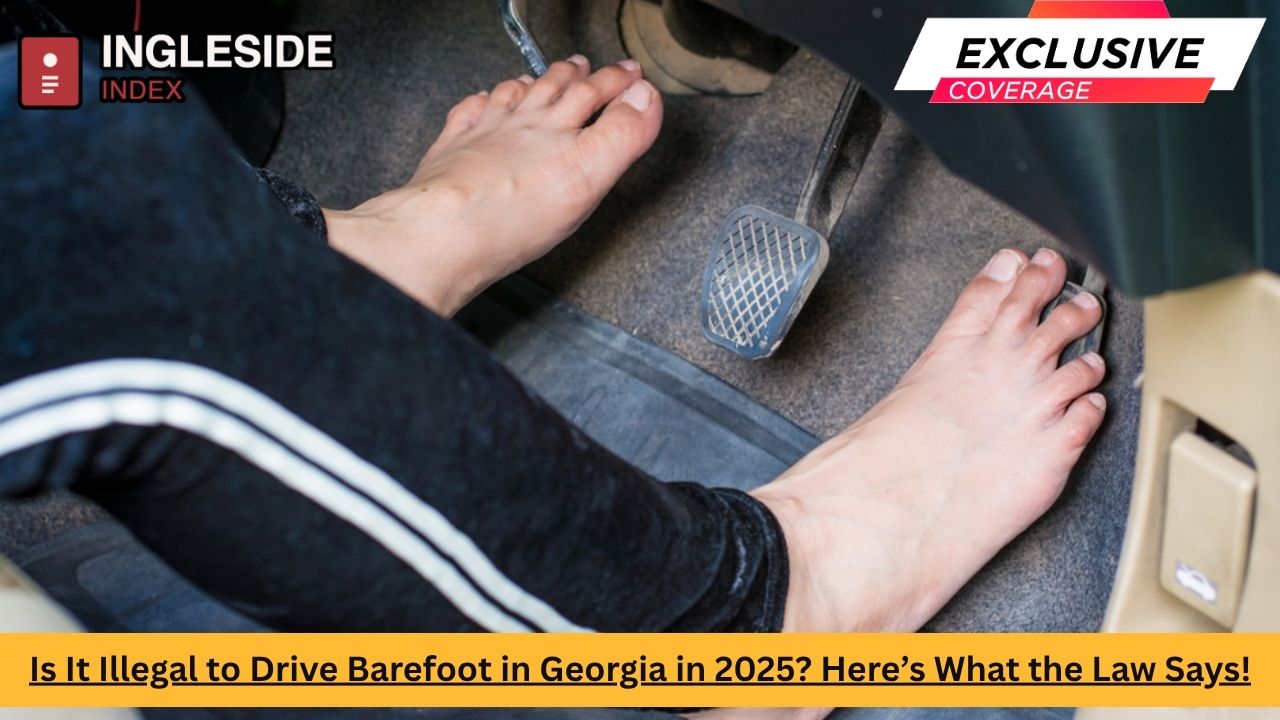Picture this: you’re leaving Venice Beach on the shores of Lake Michigan, the sand still warm between your toes after a sunny afternoon. You hop into your car, flip-flops in hand, and start the engine—barefoot. Suddenly, a question crosses your mind: Is driving barefoot in Michigan actually against the law? For decades, drivers from Detroit to Grand Rapids, Ann Arbor to Traverse City, have debated this very topic. With evolving traffic rules and an era of viral myths, it’s easy to be unsure.
This comprehensive guide peels back the fiction from the facts, providing clear answers for Michiganders in 2025. We’ll explore what Michigan state law says, the roots of the barefoot driving myth, safety considerations, how footwear can impact accident investigations, and real driving statistics to help you make informed choices. Whether you’re a new driver in Lansing or a road trip veteran cruising the scenic byways near Saugatuck, you’ll find everything you need here.
The Barefoot Driving Myth: Origins and Spread
Every summer, tales of “illegal barefoot driving” echo around lakeside towns and urban neighborhoods alike. Many Michiganders recall hearing from parents, camp counselors, or even driving instructors: “Don’t drive barefoot—it’s illegal!” Some claim it’s because you might lose control; others mention insurance risks.
The reality? This belief is widespread not only in Michigan but throughout the United States. Yet the roots are more folklore than law, passed between generations as oral warnings rather than formal statute. The myth persists thanks to occasional news segments, persistent memes, and the cautionary tone of many road safety campaigns. But what does the actual law say?
What Michigan Law Says in 2025
Let’s address the main concern directly. According to the Michigan State Police and the Michigan Vehicle Code, there is no law prohibiting drivers from operating a motor vehicle without shoes. Whether you’re gliding through the streets of Flint, navigating Ann Arbor’s traffic or heading north for a hike in Marquette, you are not required by Michigan law to have any specific footwear—or even footwear at all—while driving.
-
No statute in effect in 2025 requires drivers to wear shoes.
-
This applies for private cars, pickups, vans, and most standard passenger vehicles.
-
Law enforcement agencies, such as the MSP Iron Mountain Post, have publicly clarified there’s “nothing in the Michigan Vehicle Code that requires shoes.”
You can legally drive barefoot from Grand Rapids to Petoskey, through the busy boulevards of Livonia, or across the Mackinac Bridge. This law (or lack thereof) matches current regulations nationwide; as of 2025, not a single U.S. state bans driving barefoot.
City Spotlights: Local Traffic Attitudes from Detroit to Traverse City
Detroit
Michigan’s largest city is no stranger to car culture. While traffic officers here might warn against anything that impairs safe vehicle operation, there is no record of tickets or penalties issued solely for barefoot driving.
Grand Rapids
In Grand Rapids, especially during warm months, it’s common to see drivers ditching shoes after a day on the Grand River or a walk near John Ball Zoo. Police focus on reckless driving and distracted behaviors—not footwear.
Ann Arbor
In college towns like Ann Arbor, known for its biking, walking, and youthful energy, barefoot drivers are often spotted, particularly around local parks. Information from local troopers confirms that, barring other risky behaviors, barefoot driving is not a violation.
Traverse City
Coastal communities along Lake Michigan, such as Traverse City, attract summer tourists and residents who embrace a laid-back lifestyle. Here, hopping into the car barefoot after paddleboarding or a lakeside picnic is routine.
Understanding the Law: Why the Myth Persists
Despite the clarity of the law, many continue to believe barefoot driving is banned. Why do these myths persist?
-
Safety Campaigns: Organizations emphasize safe driving practices, sometimes recommending shoes for better pedal control. This can give the impression that barefoot driving is prohibited.
-
Insurance Considerations: In a crash, insurers may probe details—like footwear—to assess if negligence played a role, but this is not the same as a legal ban.
-
Urban Legends and Word-of-Mouth: Anecdotal stories often become local “truths,” even without legal backing.
Safety and Driving: Should You Drive Barefoot?
Legality is one thing; safety is another. Michigan’s authorities, as well as national road safety organizations, advise caution when choosing your driving attire.
Pros of Driving Barefoot
-
Potentially better “feel” for brake and gas pedals with direct skin contact.
-
No risk of sandals, flip-flops, or high heels slipping off and getting tangled beneath the pedals.
-
After a long hike or beach visit, bare feet might actually provide more precise pedal control than clunky boots.
Cons and Risks
-
Less Grip on Pedals: Bare or moist feet can slip, especially if surfaces are smooth or wet.
-
Less Protection: In a crash, broken glass or debris on the floor can injure unprotected feet.
-
Delayed Braking: Some studies suggest that shoes with solid soles provide more consistent force on the brake pedal.
Guidance from Traffic Experts
Agencies often recommend suitable driving footwear such as sneakers or flat shoes with rubber soles. Open-backed sandals, high heels, or flip-flops are discouraged, as they increase the risk of slipping or tangling.
Crash Facts: Michigan Road Safety and Driver Choices
According to 2023 data from Michigan State Police, road safety remains a pressing concern for all drivers across the state:
-
Overall vehicle crashes in Michigan fell slightly in 2023 compared to 2022, with major cities such as Detroit and Flint seeing measurable improvements.
-
Traffic deaths have not vanished—pedestrian fatalities actually increased by 6%.
-
Bicycle-related crashes rose by 10% between 2022 and 2023.
While there aren’t direct statistics about barefoot drivers specifically, the state tracks incident causes, including distracted or impaired driving, excessive speed, and mechanical issues. Improper footwear, while not illegal, can be noted in some crash investigations if it contributed to loss of vehicle control.
What If You Get in an Accident While Barefoot?
Even though it’s legal, there are important considerations if you’re involved in a crash:
-
Law enforcement may consider how you were controlling the vehicle. If being barefoot contributed to an accident (for example, your foot slipped), this might count as negligent behavior.
-
In lawsuits or insurance claims, lawyers may scrutinize every detail. If footwear—or lack of it—can be linked to reckless operation, it could affect the outcome.
-
However, simply being barefoot isn’t a crime, and most accident investigations look for evidence of distracted, impaired, or aggressive driving.
Tips for Safe Driving—Barefoot or Not
-
Make sure your feet are dry and clean before operating the pedals.
-
If you wear sandals or flip-flops, consider sliding them off before driving, but store them safely where they won’t get wedged under the pedals.
-
Stow a pair of comfortable, thin-soled driving shoes in your car, especially if you frequently switch between various types of footwear.
-
Regularly clean car mats and pedal surfaces to reduce the risk of slipping, particularly after the snowy, rainy, and muddy parts of Michigan’s climate cycle.
Exploring Michigan’s Legal Landscape: Other Unusual Rules
Michigan’s roads are home to some unique regulations and quirks, ranging from distracted driving (hands-free law in effect since 2023) to local parking ordinances in cities like Kalamazoo, Saginaw, and Lansing. The absence of a barefoot driving ban is just one example of how traffic laws differ between fact and fiction.
Other common myths include whether it’s illegal to drive with the interior light on at night (it isn’t), or whether you can get ticketed for wearing headphones (Michigan recommends against it, but it’s not always strictly policed). Drivers are encouraged to check official sources or ask local law enforcement to clarify such rumors.
Common Questions about Barefoot Driving in Michigan
Is It Ever Illegal to Drive Barefoot in Michigan?
Not under state law for regular, non-commercial passenger vehicles. However, unique regulations may apply to operators of commercial vehicles or motorcycles in different states.
Could I Get a Ticket for Driving Barefoot?
Not specifically for being barefoot. However, if barefoot driving causes you to lose control, you could be cited for reckless or negligent driving.
Does My City or County Ban Barefoot Driving?
There are no known local ordinances in major Michigan cities that prohibit barefoot driving for standard vehicle operators in 2025. If you’re unsure, check with your local city hall, especially if you live in smaller towns with unique municipal codes.
How Common Is Barefoot Driving?
More common than you might think—especially near Michigan’s lakes, beaches, and parks. In summer months, it’s a regular practice from Holland to Bay City.
Final Words: Driving Responsibly in Michigan
While the law is clear—driving barefoot is not illegal in Michigan—your personal safety is always the most important consideration. Choose footwear that supports confident, comfortable control of your vehicle, especially on longer drives. If you prefer to go barefoot, do so with awareness of the potential safety risks and the state’s road conditions, which can change quickly from the sandy beaches of Muskegon to the icy streets of Escanaba.
The best drivers, whether on I-94 through Kalamazoo or the winding roads of the Upper Peninsula, combine knowledge of the law with good judgment and common sense. Don’t let myths steer you wrong—Michigan offers freedom and responsibility in equal measure. So next time you feel the urge, go ahead and drive barefoot, knowing that you’re on the right side of the law.




